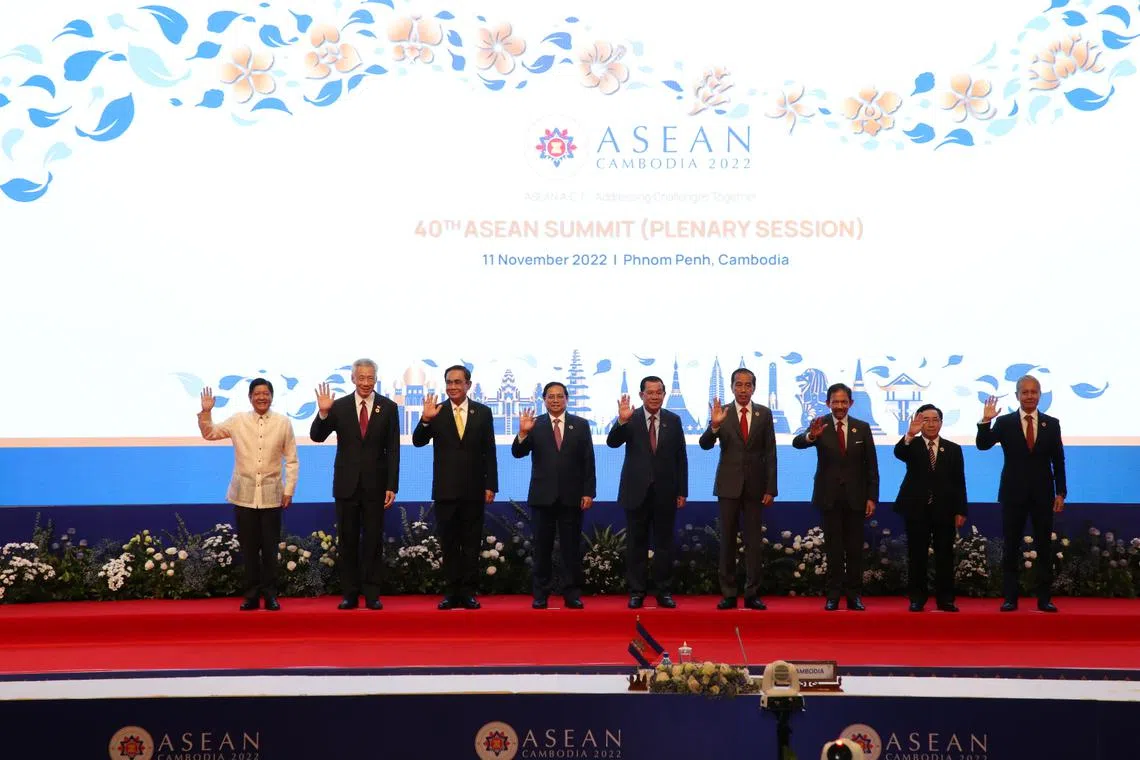PM Lee urges Asean to stay united amid escalating geopolitical tensions
Sign up now: Get insights on Asia's fast-moving developments

Singapore's Prime Minister Lee Hsien Loong (second from left) with other Asean leaders at the 40th Asean Summit on Friday. PM Lee said the grouping must maintain unity, uphold Asean centrality and continue to champion a rules-based world order.
PHOTO: MINISTRY OF COMMUNICATIONS AND INFORMATION
PHNOM PENH - Asean members need to work together and avoid allowing the region to be split amid growing major power rivalry, said Prime Minister Lee Hsien Loong on Friday.
This means the South-east Asian bloc of nations must remain open and inclusive in engaging external partners, and its members need to stay united and uphold Asean centrality so that the grouping continues to be relevant and credible, he added.
“Asean member states do not want to choose sides. We want to engage all sides, and form overlapping circles of partnerships,” said PM Lee. “We should make sure that external parties engage us on our own merits and on these terms.”
Addressing fellow leaders of the bloc at the start of the 41st Asean Summit on Friday, he noted that the world has seen an upsurge in geopolitical tensions and major power rivalry.
This includes Russia’s invasion of Ukraine,
“It disregards the principles of sovereignty, territorial integrity and political independence that are vital to all states. It has already caused the tragic loss of many lives. We should continue to urge the combatants and the major powers to find a quick and peaceful solution,” said PM Lee.
The 40th and 41st Asean summits took place on Friday, and were chaired by Cambodian Prime Minister Hun Sen. The two summits are usually held separately – one earlier and one later in the year. This year was the exception,
The regional grouping marked a milestone on Friday, when it announced that Timor Leste will be admitted in principle as its 11th member state.
On the escalating tensions between the United States and China, PM Lee told the Asean leaders that deep strategic mistrust between the two can lead to an “escalatory spiral”. He added that there is every chance of extensive technological bifurcation and splitting of supply chains.
“On present trends, there is strong likelihood of the US and China each reading the worst into the actions and intentions of the other, with grave consequences for both parties as well as for our region and the world,” said PM Lee.
A potential flashpoint is the South China Sea, and PM Lee said that given the volume of trade that passes through it, all Asean members have a stake in maintaining peace and stability there.
He stressed that the bloc should continue to insist that the freedom of navigation and overflight be upheld, and that disputes should be resolved peacefully according to international law.
Asean should continue working on the code of conduct between it and China in the South China Sea
Stressing how the bloc must stay open and inclusive in engaging external partners, PM Lee said the Asean Outlook on the Indo-Pacific represents the bloc’s shared vision on how partners should engage with the grouping to contribute to the region’s growth and stability.
During a meeting between Asean’s leaders and Chinese Premier Li Keqiang on Friday, negotiations to upgrade the Asean-China Free Trade Area were launched to further vitalise trade between the two sides. In 2021, China’s trade with the Asean countries reached US$878.2 billion (S$1.2 trillion).
PM Lee also cited the East Asia Summit as an example of how Asean brings major powers together to discuss developments and deepen cooperation. The meeting, which will be held on Sunday, will see the bloc’s leaders meeting counterparts from Australia, China, India, Japan, South Korea, New Zealand, Russia and the US.
At the earlier meeting on Friday, PM Lee made a point of how Asean has maintained peace, stability and development in South-east Asia in a volatile world.
But tensions and international conflicts show that the bloc cannot take such peace for granted, he cautioned. “The principles that have got us here today continue to stand us in good stead. We must maintain our unity, and uphold Asean centrality,” he said.
“We must continue to champion a rules-based world order, underpinned by international law.”



